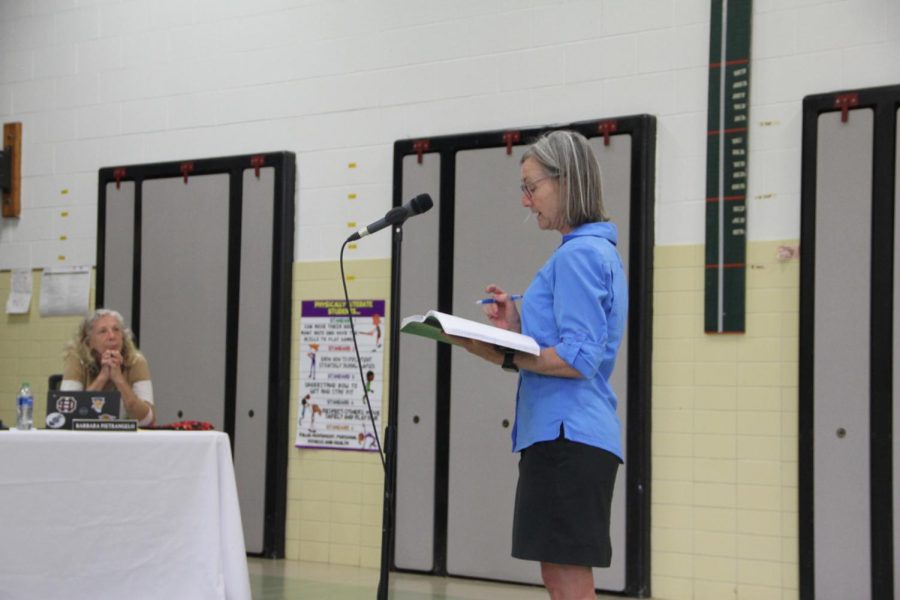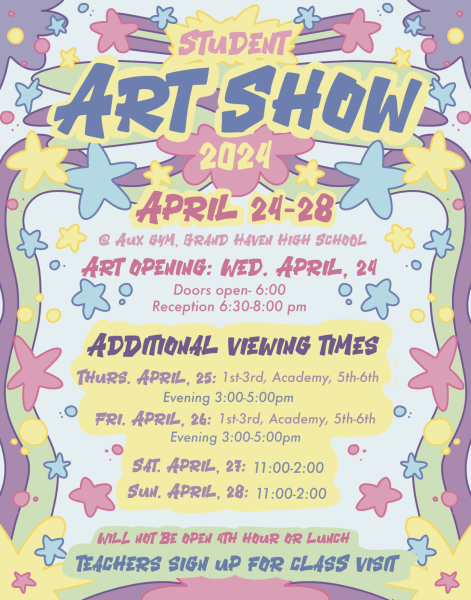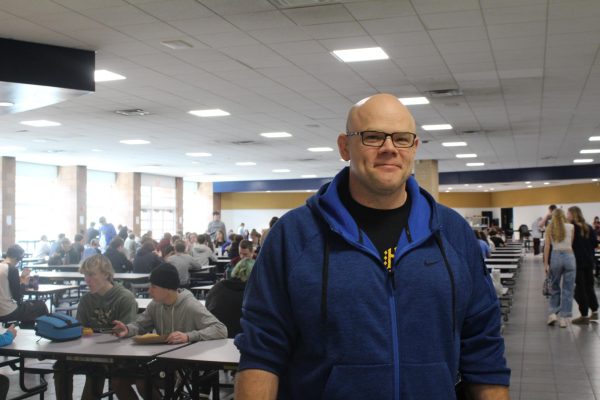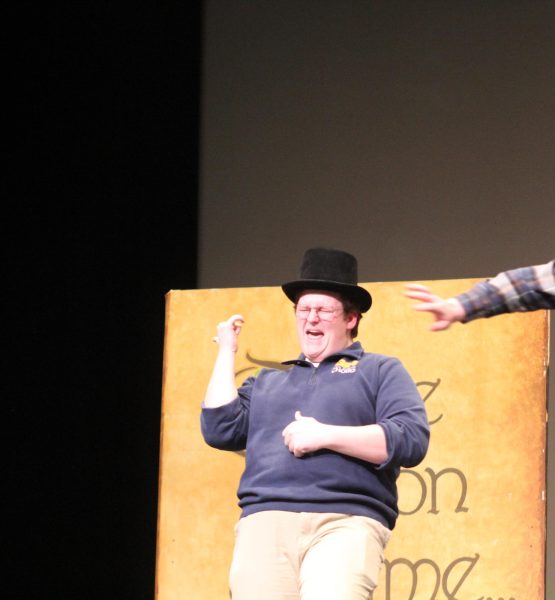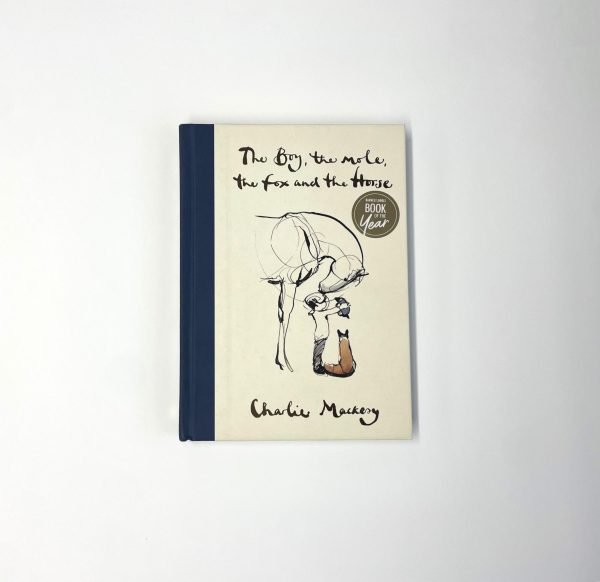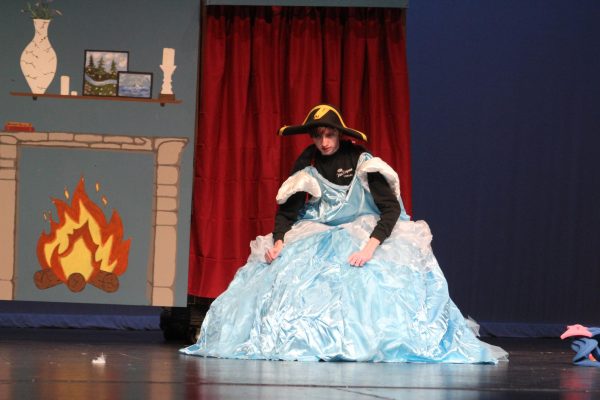Clash over library content continues
Restoring Ottawa wants parental consent for kids to be able to check out books they think are age inappropriate.
AT THE BOARD: a community member addressed the board of education on May 9 about inappropriate material.
May 24, 2022
Written language was invented roughly five and a half thousand years ago, the first book written somewhere between the second and fifth centuries, and throughout it all people debated about the ideas shared and how they changed society.
Restoring Ottawa is working to review all of the books on the list proposed by Texas senator Matt Kraus, rating them for age appropriateness based on if they contain vulgar language, sexual content, racial themes, controversial politics, or otherwise contribute to “moral breakdown of society” by undermining the nuclear family structure or encourage a divide between heterosexual parents and their child(ren). The original list contains over 800 books, approximately 300 of which are in Grand Haven school libraries.
Critics of Kraus’ list accuse it of choosing books only for containing positive views of LGBTQIA+ themes and/or explicit racial injustice, or for having authors who are part of the LGBTQIA+ community or are of an ethnic minority.
Restoring Ottawa aims to review every book on the localized list. They believe for every book the reviewer deems to have content too mature for the library’s target audience, either parental consent should be required for a student to check it out from the library or it be removed from the shelves entirely.
If reviewers think a book will be helpful for particular students but harmful to the majority, they believe that it should only be available with parental consent and recommendation from a counselor.
One of the website’s most viewed articles calls its readers to join the “smutty book taskforce,” in which members read and review books on Kraus’ list. Reviews are publicized as articles on the website, and often include direct quotes from books showcasing the contested content they contain and if the reviewer would allow their own child(ren) to read the book.
In response to questioning about why nonfiction books are on the list, Restoring Ottawa said that just because a book is on the list doesn’t mean that they think it ought to be restricted, just that others have flagged it for sensitive content.
Specifically, when the book Call Me Max by Kyle Lukoff was highlighted in elementary schools for 2021’s March is Reading Month, Restoring Ottawa took issue with it because the main character was transgender.
“With this book they taught children that gender is a choice they get to make,” said Restoring Ottawa. “They did not attempt to offer children the opposing view shared by many of their parents; There are two genders. Gender is not a choice, but observed and obvious at birth.”
They have expressed concern that the school environment has an excessively liberal political leaning and have named several administrators, specifically curriculum director Mary Jane Evink, superintendent Scott Grimes, and former assistant superintendent Brian Wheeler as those responsible.
This liberalism manifests in what Restoring Ottawa thinks are excessive displays of acceptance towards the LGBTQIA+ community, specifically how teachers were asked to introduce themselves with their preferred pronouns, and teaching Critical Race Theory.
A pair of studies done by the National Library of Medicine found that when exposed to positive role models in media with similar characteristics (ex. the same gender, ethnicity, or sexuality), children tend to develop more confidence and a strong penchant for self-realization. The idea that exposing children to people in the LGBTQIA+ community will make them want to join the community has yet to be proven.
However, administrators said that only quality books are on the shelves and that diverse topic are necessary to represent the entire student body.
“The libraries need to represent what’s in the world and what’s in our community,” said Superintendent Scott Grimes.
Curriculum director Mary Jane Evink pointed to the guidelines for determining obscenity by the Supreme Court of the United States in the 1972 case Miller v. California. Under that case, material isn’t obscene if an average person of the community would find that the work as a whole is full of vice, if it offensively describes sexual conduct under individual state law’s descriptions of such or if it “lacks serious literary, artistic, political or scientific value.”
She said that when a book is under review, if the overall quality of the novel outweighs its sex scene, then the book will stay on library shelves.
However, if the sex scene could lead to a student developing an obsession with sex, being uncomfortable, or otherwise being negatively affected by having been exposed to the scene, Evink says that the book will be removed.
“They intend to have banned cover so-called tough topics, such as sexual assault, abuse, adultery, suicide, homophobia, racism…,” said senior Paige Wilson. “I’m not arguing that all experiences are good ones, but being able to empathize with people who have gone through those things makes for a kinder, more compassionate generation of kids, a generation that thinks about others’ feelings and is considered all those around them.”

